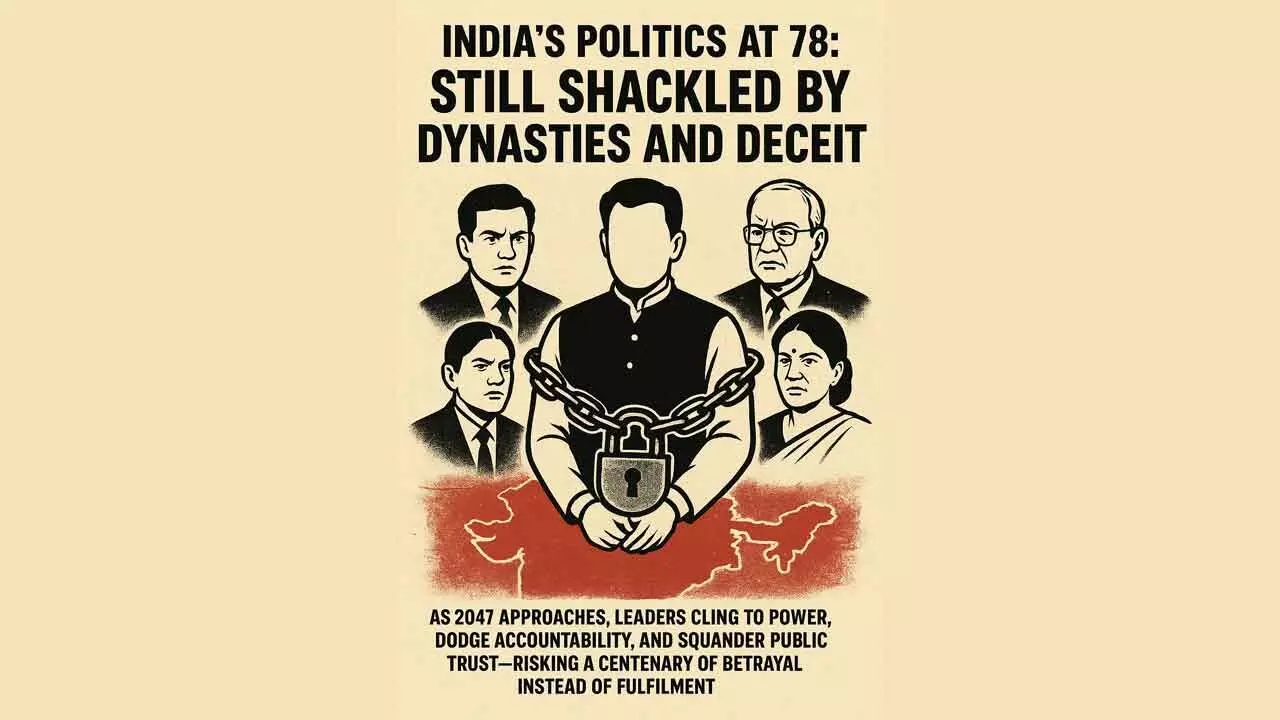Dynasties, scams and victimhood: Why Indian politics refuse to grow up
As 2047 approaches, leaders cling to power, dodge accountability, and squander public trust—risking a centenary of betrayal instead of fulfilment
Dynasties, scams and victimhood: Why Indian politics refuse to grow up

As India races toward its centenary of Independence in 2047, celebrations will ring hollow if our politics remains mired in dynasties, corruption, and victimhood narratives. The past 78 years have shown how easily accountability is sacrificed at the altar of power, with leaders across parties stalling probes, inflating egos, and reducing governance to mudslinging contests. From the Kaleshwaram debacle in Telangana to endless scams elsewhere, citizens are forced to pay the price of political arrogance. A hundred years of freedom must not culminate in the same betrayal of promises made in 1947
We are just 22 years away from 2047, when India will celebrate a century of Independence. Yet, even after 78 years of freedom, our politics is still burdened with the same vices—dynastic control, corruption, and complete absence of accountability. ‘Parivarvad’ continues to dominate Congress, BRS, YSRCP, and many others.
Instead of addressing people’s problems, political parties excel in mudslinging. The Congress and the INDIA bloc frequently cross limits in their attacks, while the BJP hits back at Rahul Gandhi, Mamata Banerjee, Arvind Kejriwal, and now Telangana CM A Revanth Reddy. The language of politics has worsened, dragging even family members of rivals—including deceased ones like PM Modi’s mother—into abuse.
One may dislike Modi, but leaders holding constitutional posts must display maturity and dignity. Sadly, statesmanship has become the first casualty of Indian politics.
Opposition parties love rhetoric but neglect responsibility. They misuse public funds, stage endless protests, but seldom contribute solutions. If even a fraction of their energy was channelled into civic governance, Indian cities would not collapse every monsoon. Hyderabad is a prime example: crores spent on apartments, yet residents wade through waterlogged streets while officials and builders blame each other. This repeats across India.
In Telangana, the BRS ruled for a decade but left behind a litany of charges:
Phone-tapping of rivals
Irregular Yadadri power project contracts
Dharani land record manipulation
A sheep distribution scam ballooning from Rs2.1 crore to a suspected Rs700 crore. But the crown jewel of alleged corruption is the Kaleshwaram project, with the Medigadda barrage now in distress due to poor design and unilateral decisions by KCR. Both Congress and BJP allege massive financial mismanagement.
And yet, no party accused of wrongdoing ever welcomes a probe. They stall investigations in court, play the victim, and pretend innocence.
The dynastic curse is not just about control but also implosion. In BRS, Kavitha—once crucial to its rise—now distances herself and is set to float her own outfit, Jagruthi. In Andhra Pradesh, YS Sharmila split from her brother Jaganmohan Reddy, joined Congress, and became PCC chief though the party is still groping in darkness and has failed to make any impact in state politics. These fractures expose the brittleness of dynastic politics.
Meanwhile, Jagan faces 29 pending criminal cases, delayed for more than a decade. Justice delayed is justice denied, but justice denied is also justice buried.
Both BRS and YSRCP have degraded political discourse. BRS used slurs against Andhra people during the Telangana agitation. YSRCP leaders hurled abuse even at women unconnected to politics and encouraged violent politics. Both survive on outdated sentiments—BRS on Telangana identity, YSRCP on perpetual victimhood.
Worse, both KCR and Jagan often boycott their own assemblies. They chase power but abandon accountability. For them, everyone else is a thief while they alone are saints.
BRS leaders like KTR now claim that CM Revanth Reddy is conspiring with Modi and Chandrababu Naidu to end Telangana’s existence by sabotaging Kaleshwaram. He alleges the CBI probe is a ploy to silence KCR. But KCR himself has been silent for nearly two years. If innocent, why not welcome the probe to clear their name? Instead, BRS plays the victim card, eroding credibility further.
On TV debates, BRS spokespersons contradict themselves—branding CBI a BJP tool, then demanding “federal agencies” instead. Such doublespeak is a colonial hangover that insults people’s intelligence.
Kaleshwaram: A Monument of Misgovernance
The Commission’s recent report on Kaleshwaram is devastating:
Suppressed expert advice: A 2015 committee warned against Medigadda, but the report was buried.
Unilateral decisions: KCR and Harish Rao bypassed Cabinet, violating rules. Bloated costs: From Rs 38,500 crore to Rs 1.1 lakh crore by 2022, with funds allegedly siphoned off.
Neglected upkeep: No inspections or maintenance; diversion structures wrongly used as storage, damaging foundations.
Dishonest planning: Shifting the site from Tummidihatti to Medigadda deemed insincere.
The Commission held KCR and then Finance Minister Eatala Rajender responsible for bypassing procedures and ignoring expert advice. The project, once hailed as Telangana’s lifeline, now stands as a financial and structural disaster.
A Democracy Without Shame
What does all this reveal? That India’s political class—across parties—fears accountability more than defeat. They will cling to power, stall probes, and invent conspiracies rather than admit mistakes. Civic issues remain unaddressed, mega-projects become scams, and citizens foot the bill.
Time for a Reset
As 2047 approaches, India risks entering its centenary still shackled by the same old vices: dynasties, corruption, victimhood politics, and intolerance. If leaders truly care for their legacy, they must embrace accountability. Admitting mistakes—even at the cost of losing power—earns respect. Playing victim erodes it.
India’s people want honest politics, not endless rhetoric. The centenary of Independence should not be a mirror reflecting 100 years of squandered opportunities. It must be the moment when politics grows up.
And if our leaders cannot learn this simple truth, then 2047 will not be a celebration of freedom fulfilled but a reminder of promises betrayed.
(The author is a former Chief Editor at The Hans India)

